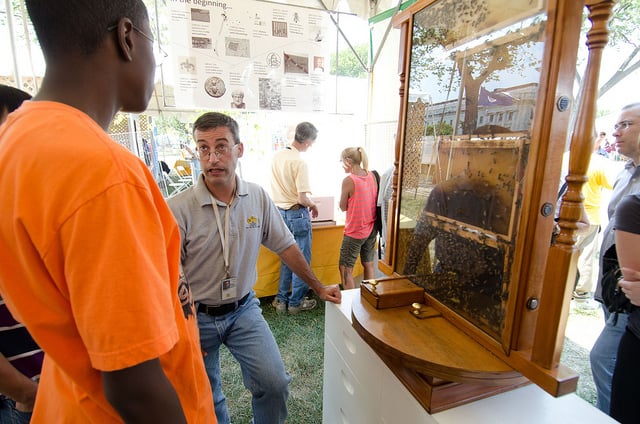Hunt. (2012). The Rise of Urban Beekeeping in Washington. The Washingtonian. November 2012. "Colony Collapse Disorder is a real concern—but some backyard beekeepers are trying to combat it." Hunt. (2012). The Rise of Urban Beekeeping in Washington. The Washingtonian. November 2012.
Category: BIP In The News
2012 Smithsonian Folklife Festival
The Smithsonian Folklife Festival is an annual festival held on the National Mall in Washington, D.C. that celebrates cultural diversity and traditions. The USDA Bee Research Lab was asked to participate this year as part of the theme “Campus and Community”. The festival commemorated the 150th anniversary of USDA and land-grant universities. Abraham Lincoln signed the Morill Act in 1862 which, in part, initiated research partnerships between USDA and public universities (not unlike the Bee Informed Partnership!) A group of us from BIP were lucky enough to be able to participate in the festival on June 29th: myself, Karen Rennich, Heather Eversole and Jennie Stitzinger.…
Boots on the Ground: A Radical Shift in the Interface Between Research and Real World.
McNeil. (2012). Boots on the Ground: A Radical Shift in the Interface Between Research and Real World. Bee Culture. April 2012. "Booooos from the back of the audience were directed to the young woman on the stage at the California Beekeepers Association Conference. Without the context, the message could easily have been misconstrued....." McNeil. (2012). Boots on the Ground: A Radical Shift in the Interface Between Research and Real World. Bee Culture. April 2012.
Coordinated BIP effort aims to cut in half annual bee colony losses.
BEE Informed Partnership: Coordinated BIP effort aims to cut in half annual bee colony losses. by Richard Lehnert Good Fruit Grower magazine article, March 15th, 2012. "After five years of annual colony losses near or above 30 percent, beekeepers have settled in for the long haul in their struggle to find solutions to the problem of unsustainably high honeybee death losses. Scientists have also settled in to help them..."continue article here...
Worldwide Honey Bee Colony Losses Continue
http://www.ibra.org.uk/articles/US-honey-bee-winter-colony-losses-2010-11 International Bee Research Association The world's longest established apicultural research publishers Press Release[embargoed until 00:01 GMT on 1/2/12] Worldwide honey bee colony losses continue Since 2006 there has been concern worldwide about losses of honey bee colonies, especially the phenomenon of “Colony Collapse Disorder” in the USA. Information about the extent of these losses has,to date, been patchy, unsystematic and difficult to compare year on year and from country to country. Today, for the first time, the results of systematic surveys in Europe, north America, China, Israel and Turkey are published together in the Journal of Apicultural Research. The research has been carried out…
USDA/AIA Survey Reports 2010/2011 Winter Honey Bee Losses
USDA/AIA Survey Reports 2010/2011 Winter Honey Bee Losses http://www.ars.usda.gov/is/pr/2011/110523.htm
UCCE to Lead Technology Transfer in New Honey Bee Health Initiative
http://ucanr.org/news/?uid=1386&ds=191 UCCE to lead technology transfer in new honey bee health initiative: The technology transfer component of a newly funded nationwide initiative designed to monitor and maintain honey bee health will be hosted by UC Cooperative Extension in Butte County... UCCE news story: http://ucanr.org/news/?uid=1386&ds=191
Nationwide Partnership Seeks to Halve Honeybee Losses
News story at: http://www.ens-newswire.com/ens/may2011/2011-05-19-092.html UNIVERSITY PARK, Pennsylvania, May 19, 2011 (ENS) - A new nationwide network to monitor and maintain honeybee health is being created by the Bee Informed Partnership. Their goal is to help honeybees to recover from assaults such as mites, fungii, pesticides, competition by alien species, the disappearance of flowering plants, air pollution and climate change that have caused bee colonies to collapse not only across the United States but around the world....
PSU Leads Multidisciplinary Effort to Save Honeybees
News story at http://www.pamatters.com/2011/05/26/psu-leads-multidisciplinary-effort-to-save-honeybees/ Researchers from seven universities, beekeepers in every state, economists, epidemiologists and others have joined the Bee Informed Partnership. Senior extension associate at Penn State Dennis vanEngelsdorp is leading the project, and tells us honeybees are essential to agriculture. “About one in every three bites of food we eat is either directly or indirectly pollinated by honeybees,” he says.... News story at http://www.pamatters.com/2011/05/26/psu-leads-multidisciplinary-effort-to-save-honeybees/
BIP at farmdocDAILY
Read farmdocDAILY's May 2011 article about Honey Bee Health and the Bee Informed Partnership http://www.farmdocdaily.illinois.edu/2011/05/honey_bee_health.html

